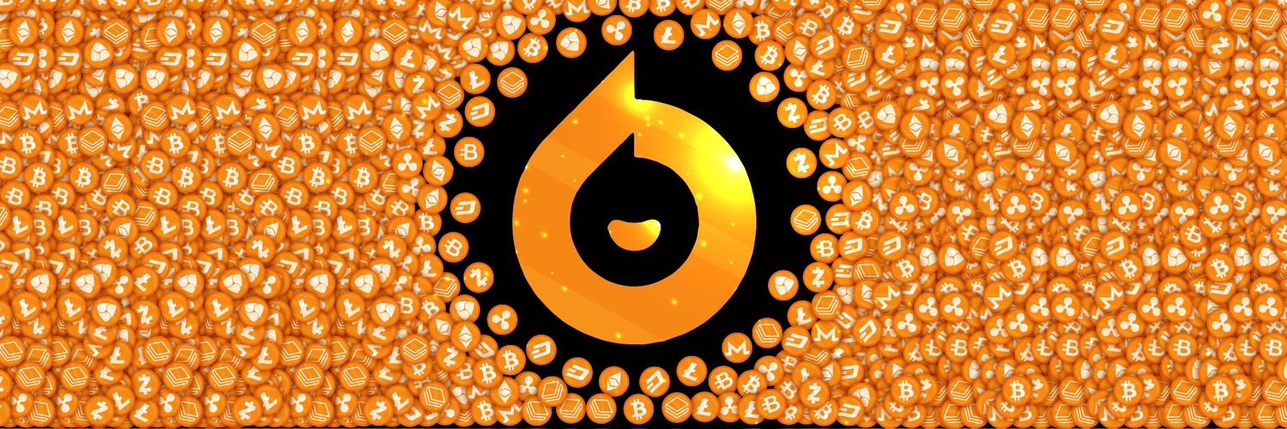Bitget: a 4ª maior corretora do mundo por volume de trading diário!
Participação de mercado do BTC62.80%
Novas listagens na Bitget : Pi Network
BTC/USDT$84475.90 (+1.19%)Índice de Medo e Ganância31(Medo)
Índice da temporada de altcoins:0(Temporada do Bitcoin)
Moedas listadas no pré-mercadoPAWS,WCTFluxo líquido total de ETFs spot de Bitcoin -$1M (1D); -$872.6M (7D).Pacote de presente de boas-vindas para novos usuários no valor de 6.200 USDT.Resgatar agora
Opere a qualquer hora e em qualquer lugar com o app da Bitget. Baixe agora
Bitget: a 4ª maior corretora do mundo por volume de trading diário!
Participação de mercado do BTC62.80%
Novas listagens na Bitget : Pi Network
BTC/USDT$84475.90 (+1.19%)Índice de Medo e Ganância31(Medo)
Índice da temporada de altcoins:0(Temporada do Bitcoin)
Moedas listadas no pré-mercadoPAWS,WCTFluxo líquido total de ETFs spot de Bitcoin -$1M (1D); -$872.6M (7D).Pacote de presente de boas-vindas para novos usuários no valor de 6.200 USDT.Resgatar agora
Opere a qualquer hora e em qualquer lugar com o app da Bitget. Baixe agora
Bitget: a 4ª maior corretora do mundo por volume de trading diário!
Participação de mercado do BTC62.80%
Novas listagens na Bitget : Pi Network
BTC/USDT$84475.90 (+1.19%)Índice de Medo e Ganância31(Medo)
Índice da temporada de altcoins:0(Temporada do Bitcoin)
Moedas listadas no pré-mercadoPAWS,WCTFluxo líquido total de ETFs spot de Bitcoin -$1M (1D); -$872.6M (7D).Pacote de presente de boas-vindas para novos usuários no valor de 6.200 USDT.Resgatar agora
Opere a qualquer hora e em qualquer lugar com o app da Bitget. Baixe agora



Preço de Virtuals ProtocolVIRTUAL
Listada
Moeda de cotação:
EUR
€0.5081+8.14%1D
Conversão de VIRTUAL para EUR
VIRTUAL
EUR
1 VIRTUAL = 0.00 EUR
A Bitget oferece as menores taxas de transação do mercado. Quanto mais alto for seu nível VIP, melhores serão as taxas.
Preço
TradingView
Capitalização de mercado
Gráfico de preços de Virtuals Protocol (VIRTUAL/EUR)
Última atualização em 2025-04-14 23:45:55(UTC+0)
Capitalização de mercado:€330,906,294.61
Capitalização de mercado totalmente diluída:€330,906,294.61
Volume em 24h:€108,094,313.26
Volume em 24h / capitalização de mercado:32.66%
Máxima em 24h:€0.5193
Mínima em 24h:€0.4716
Máxima histórica:€4.47
Mínima histórica:€0.006705
Oferta circulante:651,215,600 VIRTUAL
Oferta total:
1,000,000,000VIRTUAL
Porcentagem em circulação:65.00%
Oferta máxima:
1,000,000,000VIRTUAL
Preço em BTC:0.{5}6807 BTC
Preço em ETH:0.0003544 ETH
Contratos:
0x0b3e...24e7E1b(Base)
Mais
Como é a sua opinião sobre Virtuals Protocol hoje?
Observação: essas informações servem apenas como referência.
Relatório de análise de IA sobre Virtuals Protocol
Destaques de hoje do mercado de criptomoedasVer relatório
Preço de hoje de Virtuals Protocol em EUR
O preço em tempo real de Virtuals Protocol hoje é €0.5081 EUR, com uma capitalização de mercado atual de €330.91M. O preço de Virtuals Protocol aumentou 8.14% nas últimas 24 horas e o volume de trading em 24 horas é de €108.09M. A taxa de conversão de VIRTUAL/EUR (de Virtuals Protocol para EUR) é atualizada em tempo real.
Histórico de preços de Virtuals Protocol (EUR)
O preço de Virtuals Protocol variou +206.68% no último ano. O preço mais alto de VIRTUAL em EUR no último ano foi €4.47 e o preço mais baixo de VIRTUAL em EUR no último ano foi €0.01779.
PeríodoVariação de preço (%) Preço mais baixo
Preço mais baixo Preço mais alto
Preço mais alto 
 Preço mais baixo
Preço mais baixo Preço mais alto
Preço mais alto 
24h+8.14%€0.4716€0.5193
7d+21.85%€0.3745€0.5546
30d-20.74%€0.3745€0.7381
90d-80.98%€0.3745€3.49
1y+206.68%€0.01779€4.47
Todo o período+1057.55%€0.006705(2024-01-23, 1 anos(s) atrás )€4.47(2025-01-02, 103 dia(s) atrás )
Qual é o preço mais alto do token Virtuals Protocol?
A máxima histórica (ATH) de Virtuals Protocol em EUR foi €4.47, registrada em 2025-01-02. Em comparação com a máxima histórica de Virtuals Protocol, o preço atual de Virtuals Protocol caiu 88.63%.
Qual é o preço mais baixo do token Virtuals Protocol?
A mínima histórica de Virtuals Protocol em EUR foi €0.006705, registrada em 2024-01-23. Em comparação com a máxima histórica de Virtuals Protocol, o preço atual de Virtuals Protocol subiu 7478.17%.
Previsão de preço do token Virtuals Protocol
Qual será o preço do token VIRTUAL em 2026?
Com base no modelo de previsão do desempenho histórico de preços de VIRTUAL, estima-se que o preço de VIRTUAL atinja €0.6732 em 2026.
Qual será o preço do token VIRTUAL em 2031?
Em 2031, espera-se que o preço de VIRTUAL varie em +26.00%. Ao final de 2031, estima-se que o preço de VIRTUAL atinja €1.51, com um ROI acumulado de +209.31%.
Perguntas frequentes
Quais fatores influenciam o preço do Virtuals Protocol?
O preço do Virtuals Protocol é influenciado por vários fatores, incluindo demanda e oferta de mercado, avanços tecnológicos, notícias regulatórias, parcerias e o desempenho geral do mercado de criptomoedas.
Como posso comprar Virtuals Protocol na Bitget Exchange?
Para comprar Virtuals Protocol na Bitget Exchange, você precisa criar uma conta, verificar sua identidade, depositar fundos e depois pode procurar o par de negociação Virtuals Protocol para fazer uma compra.
Qual é a previsão de preço futuro para o Virtuals Protocol?
É desafiador fornecer uma previsão exata de preço para o Virtuals Protocol devido à volatilidade do mercado, mas os analistas costumam observar fatores como desenvolvimento de projetos, tendências de mercado e taxas de adoção para um potencial crescimento futuro.
Por que o preço do Virtuals Protocol é tão volátil?
O preço do Virtuals Protocol é volátil porque o mercado de criptomoedas ainda é relativamente novo, com menor liquidez em comparação com os mercados tradicionais, e é influenciado por negociações especulativas e pelo sentimento do mercado.
O preço do Protocolo Virtual pode atingir R$100?
Embora alcançar R$100 seja possível, isso dependeria de aumentos significativos na demanda, adoção, parcerias e condições de mercado mais amplas, o que pode levar tempo para se desenvolver.
Como o staking do Virtuals Protocol afeta seu preço?
O staking do Virtuals Protocol pode reduzir a oferta disponível nas exchanges, potencialmente aumentando o preço se a demanda permanecer estável ou aumentar. Ele também incentiva a retenção, reduzindo a pressão de venda.
Quais são os riscos de investir no Protocolo Virtual?
Os riscos incluem alta volatilidade do mercado, mudanças regulatórias, potenciais vulnerabilidades de segurança e concorrência de outros projetos de blockchain. Os investidores devem fazer uma pesquisa completa antes de investir.
Com que frequência o preço do Protocolo Virtual muda?
O preço do Protocolo Virtual pode mudar a cada poucos segundos em plataformas de negociação como a Bitget Exchange, pois é determinado pela oferta e demanda do mercado em tempo real.
O Protocolo Virtuals é um bom investimento?
Se o Protocolo Virtuals é um bom investimento depende da tolerância ao risco individual, dos objetivos de investimento e da análise de mercado. É importante pesquisar e considerar tendências, casos de uso e a equipe por trás do projeto.
O que devo verificar antes de comprar o Virtuals Protocol?
Antes de comprar o Virtuals Protocol, verifique sua posição no mercado, as últimas notícias, atualizações de desenvolvimento, o volume de negociação na Bitget Exchange e o envolvimento da comunidade para tomar uma decisão informada.
Qual é o preço atual de Virtuals Protocol?
O preço em tempo real de Virtuals Protocol é €0.51 por (VIRTUAL/EUR), com uma capitalização de mercado atual de €330,906,294.61 EUR. O valor de Virtuals Protocol sofre oscilações frequentes devido às atividades 24h do mercado de criptomoedas. O preço atual e os dados históricos de Virtuals Protocol estão disponíveis na Bitget.
Qual é o volume de trading em 24 horas de Virtuals Protocol?
Nas últimas 24 horas, o volume de trading de Virtuals Protocol foi €108.09M.
Qual é o recorde histórico de Virtuals Protocol?
A máxima histórica de Virtuals Protocol é €4.47. Essa máxima histórica é o preço mais alto para Virtuals Protocol desde que foi lançado.
Posso comprar Virtuals Protocol na Bitget?
Sim, atualmente, Virtuals Protocol está disponível na Bitget. Para informações detalhadas, confira nosso guia Como comprar virtual-protocol .
É possível obter lucros constantes ao investir em Virtuals Protocol?
Claro, a Bitget fornece uma plataforma de trading estratégico com robôs de trading para automatizar suas operações e aumentar seus lucros.
Onde posso comprar Virtuals Protocol com a menor taxa?
Temos o prazer de anunciar que a plataforma de trading estratégico já está disponível na corretora da Bitget. A Bitget é líder de mercado no que diz respeito a taxas de trading e profundidade, o que garante investimentos lucrativos para os traders.
Notícias sobre Virtuals Protocol
Ver mais
Atualizações sobre Virtuals Protocol
Mercado de Virtuals Protocol
Total de ativos de Virtuals Protocol
Virtuals Protocol - Matriz de distribuição do total de ativos
Virtuals Protocol - Total de ativos por concentração
Baleias
Investidores
Varejo
Virtuals Protocol - Endereços por tempo de manutenção
Holders
Cruisers
Traders
Gráfico de preços ao vivo de coinInfo.name (12)

Preços globais de Virtuals Protocol
Qual é o valor de Virtuals Protocol em outras moedas atualmente? Última atualização: 2025-04-14 23:45:55(UTC+0)
VIRTUAL para MXN
Mexican Peso
$11.59VIRTUAL para GTQGuatemalan Quetzal
Q4.44VIRTUAL para CLPChilean Peso
$558.56VIRTUAL para UGXUgandan Shilling
Sh2,113.37VIRTUAL para HNLHonduran Lempira
L14.94VIRTUAL para ZARSouth African Rand
R10.87VIRTUAL para TNDTunisian Dinar
د.ت1.73VIRTUAL para IQDIraqi Dinar
ع.د754.91VIRTUAL para TWDNew Taiwan Dollar
NT$18.65VIRTUAL para RSDSerbian Dinar
дин.59.4VIRTUAL para DOPDominican Peso
$35.53VIRTUAL para MYRMalaysian Ringgit
RM2.54VIRTUAL para GELGeorgian Lari
₾1.59VIRTUAL para UYUUruguayan Peso
$24.76VIRTUAL para MADMoroccan Dirham
د.م.5.34VIRTUAL para OMROmani Rial
ر.ع.0.22VIRTUAL para AZNAzerbaijani Manat
₼0.98VIRTUAL para KESKenyan Shilling
Sh74.66VIRTUAL para SEKSwedish Krona
kr5.64VIRTUAL para UAHUkrainian Hryvnia
₴23.79- 1
- 2
- 3
- 4
- 5
Como comprar Virtuals Protocol(VIRTUAL)

Crie sua conta na Bitget gratuitamente
Crie sua conta na Bitget com seu e-mail ou número de celular e escolha uma senha forte para proteger sua conta.

Verifique sua conta
Verifique sua identidade inserindo suas informações pessoais e enviando um documento de identidade válido com foto.

Converter Virtuals Protocol em VIRTUAL
Escolha quais criptomoedas operar na Bitget.
Saiba maisOpere futuros perpétuos de VIRTUAL
Depois de abrir sua conta na Bitget e comprar tokens USDT ou VIRTUAL, você pode começar a operar derivativos, como futuros de VIRTUAL e operar com margem para aumentar sua renda.
O preço atual de VIRTUAL é €0.5081, com uma variação de preço em 24 horas de +8.14%. Os traders podem lucrar com um posições long ou short em futuros de VIRTUAL.
Siga traders de elite e faça Copy Trade de VIRTUAL.
Depois de criar sua conta na Bitget e comprar tokens USDT ou VIRTUAL, você também pode começar a seguir traders de elite e fazer copy trades.
Novas listagens na Bitget
Novas listagens
Comprar mais
Onde posso comprar Virtuals Protocol (VIRTUAL)?
Compre cripto no app da Bitget
Crie uma conta em poucos minutos para comprar cripto com cartão de crédito ou transferência bancária.
Seção de vídeos: verificação e operações rápidas

Como concluir a verificação de identidade na Bitget e se proteger contra golpes
1. Faça login na sua conta Bitget.
2. Se você for novo na Bitget, assista ao nosso tutorial sobre como criar uma conta.
3. Passe o mouse sobre o ícone do seu perfil, clique em "Não verificado" e clique em "Verificar".
4. Escolha seu país ou região emissora, o tipo de documento de identidade e siga as instruções.
5. Selecione como prefere concluir sua verificação: pelo app ou computador.
6. Insira seus dados, envie uma cópia do seu documento de identidade e tire uma selfie.
7. Envie sua solicitação e pronto. Verificação de identidade concluída!
Os investimentos em criptomoedas, incluindo a compra de Virtuals Protocol na Bitget, estão sujeitos a risco de mercado. A Bitget fornece maneiras fáceis e convenientes para você comprar Virtuals Protocol. Fazemos o possível para informar totalmente nossos usuários sobre cada criptomoeda que oferecemos na corretora. No entanto, não somos responsáveis pelos resultados que possam advir da sua compra Virtuals Protocol. Esta página e qualquer informação incluída não são um endosso de investimento ou a nenhuma criptomoeda em particular.
Conversão de VIRTUAL para EUR
VIRTUAL
EUR
1 VIRTUAL = 0.5081 EUR
A Bitget oferece as menores taxas de transação do mercado. Quanto mais alto for seu nível VIP, melhores serão as taxas.
Avaliações de Virtuals Protocol
Média de avaliações da comunidade
4.6
Este conteúdo é apenas para fins informativos.
Bitget Insights
demelu
10h
BTC overview
---
1. Introduction to Bitcoin (BTC)
Bitcoin (BTC) is the first and most well-known cryptocurrency—a digital or virtual currency that uses cryptography for security. It is decentralized, meaning it operates without a central authority like a bank or government.
Launched: January 2009
Creator: Satoshi Nakamoto (pseudonymous person or group)
Ticker Symbol: BTC
Max Supply: 21 million coins
---
2. The Origin and Whitepaper
In October 2008, Satoshi Nakamoto published the Bitcoin whitepaper titled "Bitcoin: A Peer-to-Peer Electronic Cash System". The goal was to create a system where people could send money directly to each other without needing intermediaries like banks.
Key Innovations:
Blockchain: A distributed ledger that records all transactions.
Proof of Work (PoW): A consensus mechanism to validate transactions and secure the network.
Decentralization: No single entity controls Bitcoin.
---
3. How Bitcoin Works
a. Blockchain Technology
Bitcoin transactions are grouped into blocks, which are linked to form a chain. This blockchain is maintained by a network of computers (nodes) worldwide.
b. Mining and Proof of Work
Miners use powerful computers to solve cryptographic puzzles. The first to solve it gets to add a new block to the blockchain and is rewarded with newly minted bitcoins plus transaction fees.
Current Block Reward: 3.125 BTC (as of April 2024 halving)
Halving: Happens every 4 years, cutting the block reward in half.
c. Wallets and Addresses
Bitcoin users store their coins in wallets (software or hardware), which are secured using private keys. Public addresses are used to receive BTC.
---
4. Economic Model
Bitcoin’s economy is based on scarcity and deflationary design:
Fixed Supply: Only 21 million BTC will ever exist.
Divisibility: 1 BTC = 100,000,000 satoshis.
Decentralized issuance: New BTC is created only through mining.
---
5. Use Cases
a. Store of Value (Digital Gold)
Many see Bitcoin as a hedge against inflation and economic instability.
b. Medium of Exchange
Used for peer-to-peer transactions, especially where traditional financial systems are limited.
c. Cross-Border Transfers
Bitcoin enables fast and inexpensive international remittances.
d. Investment Asset
BTC is traded globally on thousands of exchanges and is a popular choice for crypto portfolios.
---
6. Advantages of Bitcoin
Decentralization: No single point of failure or control.
Transparency: All transactions are public and auditable.
Security: Strong cryptographic protections.
Censorship Resistance: Hard to block or reverse transactions.
Borderless: Works globally without intermediaries.
---
7. Criticisms and Challenges
a. Volatility
BTC price can be highly unstable, making it less practical for day-to-day payments.
b. Scalability
Bitcoin's network can only process ~7 transactions per second, which is low compared to centralized systems like Visa.
c. Energy Consumption
Proof of Work mining uses large amounts of electricity, raising environmental concerns.
d. Regulatory Uncertainty
Many governments are still figuring out how to regulate Bitcoin and crypto assets.
---
8. Bitcoin Today (as of 2025)
Price: Varies with market trends, influenced by demand, macroeconomic factors, and global adoption.
Institutional Adoption: Major companies, funds, and even governments have added BTC to their holdings.
Lightning Network: A layer 2 solution that enables faster, cheaper transactions for small payments.
---
9. Future Outlook
Mainstream Adoption: Increasing acceptance among businesses, users, and governments.
Technological Upgrades: Efforts to scale (e.g., Lightning), improve privacy, and enhance interoperability.
Competition: Faces competition from other cryptocurrencies (e.g., Ethereum, stablecoins, CBDCs).
---
Conclusion
Bitcoin represents a paradigm shift in how people think about money, trust, and decentralized systems. Whether as a store of value, financial experiment, or a tool for economic freedom, Bitcoin continues to evolve and influence global finance and technology.
---
$BTC
BTC+0.84%
VIRTUAL+6.02%
Mtseorketswarga
11h
What is Bitcoin (BTC)?
Bitcoin (BTC) is the first and most well-known cryptocurrency, a form of digital or virtual currency that operates independently of any central authority or government. It was introduced in 2009 by an anonymous person or group using the pseudonym Satoshi Nakamoto.
Bitcoin allows peer-to-peer transactions over the internet, using cryptographic techniques to secure and verify transactions and to control the creation of new units.
---
Origins of Bitcoin
The Whitepaper
Bitcoin was introduced in a whitepaper titled "Bitcoin: A Peer-to-Peer Electronic Cash System" published by Satoshi Nakamoto in October 2008. The paper outlined a decentralized system for digital cash that does not rely on trust or centralized institutions.
Genesis Block
The first block of the Bitcoin blockchain, called the Genesis Block or Block 0, was mined on January 3, 2009. Embedded in the block was the text:
> "The Times 03/Jan/2009 Chancellor on brink of second bailout for banks"
This served as both a timestamp and a commentary on the instability of the traditional banking system.
---
How Bitcoin Works
Blockchain Technology
Bitcoin is built on a blockchain, a distributed ledger that records all transactions in a transparent and immutable manner. Each block contains:
A batch of transactions
A timestamp
A reference to the previous block (hash)
This structure ensures that once data is recorded, it cannot be altered retroactively.
Mining
New bitcoins are created through a process called mining, where powerful computers solve complex cryptographic puzzles. This:
Verifies and secures transactions
Adds them to the blockchain
Rewards the miner with newly minted BTC (block reward)
The reward started at 50 BTC and halves roughly every 4 years (called the halving). As of 2024, the block reward is 3.125 BTC.
Supply Cap
Bitcoin has a maximum supply of 21 million BTC, making it deflationary. This is in contrast to fiat currencies, which can be printed without limit.
---
Bitcoin's Use Cases
1. Digital Gold / Store of Value
Bitcoin is often called “digital gold” due to its limited supply and resistance to inflation.
2. Medium of Exchange
While slower and more expensive than some altcoins, BTC can be used to buy goods and services worldwide.
3. Remittances and Cross-border Payments
Bitcoin enables near-instant, low-fee international transactions compared to traditional banking systems.
4. Hedge Against Inflation
In countries with high inflation, Bitcoin is used to preserve value.
---
Key Features
---
Bitcoin’s Market Impact
Volatility
Bitcoin's price is highly volatile, influenced by market sentiment, news, regulation, and macroeconomic trends.
Adoption
El Salvador made Bitcoin legal tender in 2021.
Major companies (e.g., Tesla, MicroStrategy) have added BTC to their balance sheets.
Increasing institutional interest (ETFs, custody solutions, etc.)
Regulation
Governments and regulators worldwide have taken different approaches—from acceptance and regulation to bans and crackdowns.
---
Pros and Cons
Pros:
Decentralized and censorship-resistant
Low transaction fees (especially for large or cross-border transfers)
Transparent and secure
Hedge against fiat inflation
Cons:
Price volatility
Scalability issues (low TPS)
High energy usage from mining
Limited privacy (public ledger)
---
Bitcoin vs Traditional Money
---
Future Outlook
Bitcoin is still evolving. Some trends to watch:
Layer 2 solutions like the Lightning Network improve scalability and transaction speed.
Regulatory clarity will shape institutional adoption.
Tokenization and integration with other blockchain systems may broaden its utility.
The next halving event (around 2028) will further reduce new supply.
---
Conclusion
Bitcoin represents a revolutionary shift in how we think about money, trust, and value transfer. Whether as a speculative asset, a store of value, or a tool for financial inclusion, it has already made a profound impact on finance and technology. However, its future will depend on regulatory developments, technical improvements, and global adoption trends.$BTC
BTC+0.84%
VIRTUAL+6.02%
Mtseorketswarga
11h
What is Bitcoin (BTC)?
Bitcoin (BTC) is the first and most well-known cryptocurrency—a digital or virtual currency that uses cryptography for security and operates on a decentralized network called a blockchain. It was introduced in 2009 by a pseudonymous individual or group known as Satoshi Nakamoto.
Bitcoin was created to serve as an alternative to traditional fiat currencies and centralized banking systems. It allows peer-to-peer transactions without the need for intermediaries like banks or governments.
---
Key Features of Bitcoin
1. Decentralization
Bitcoin operates on a peer-to-peer network maintained by nodes (computers) around the world. No single entity controls the Bitcoin network, making it decentralized.
2. Blockchain Technology
Transactions are recorded in a public ledger called the blockchain, which is maintained by a distributed network of computers (nodes). This ledger is immutable, transparent, and secure.
3. Limited Supply
Bitcoin has a fixed supply cap of 21 million coins. This scarcity is built into the protocol to mimic precious metals like gold and to prevent inflation.
4. Mining and Proof-of-Work
New bitcoins are created through a process called mining, where computers solve complex mathematical problems to validate transactions. This is known as Proof-of-Work (PoW).
5. Pseudonymity
Bitcoin addresses are not directly tied to users' real identities, providing a level of privacy. However, transactions are publicly visible on the blockchain.
---
How Bitcoin Works
1. Transactions: A user initiates a transaction by sending BTC to another user’s wallet address.
2. Broadcasting: The transaction is broadcast to the Bitcoin network.
3. Mining: Miners verify the transaction by solving a cryptographic puzzle.
4. Block Creation: Once verified, the transaction is added to a new block.
5. Blockchain Update: The block is added to the blockchain, and the transaction is confirmed.
---
Use Cases of Bitcoin
Digital Store of Value (often referred to as "digital gold")
Borderless Payments and remittances
Hedge Against Inflation, especially in countries with unstable fiat currencies
Investment Asset in cryptocurrency portfolios
Payment Method accepted by some online and offline merchants
---
Advantages of Bitcoin
Security: Strong cryptographic algorithms
Decentralized: No need for intermediaries
Transparency: Public ledger visible to all
Global: Can be used anywhere with internet access
Immutable: Transactions cannot be altered once confirmed
---
Risks and Challenges
Volatility: BTC prices can fluctuate dramatically
Scalability: Limited transactions per second compared to traditional systems
Energy Consumption: PoW mining requires significant energy
Regulatory Risks: Government crackdowns or restrictions
Loss of Access: Losing private keys or wallets can mean losing funds permanently
---
Bitcoin's Market Position
BTC is the largest cryptocurrency by market capitalization.
It often influences the broader crypto market, acting as a benchmark.
It’s listed on virtually every cryptocurrency exchange and supported by most wallets.
---
Recent Developments (as of 2025)
Bitcoin ETFs have been approved in several countries, enabling institutional investment.
Layer 2 solutions like the Lightning Network are helping scale Bitcoin for faster, cheaper transactions.
Countries like El Salvador have adopted Bitcoin as legal tender.
Growing interest in Bitcoin Ordinals and NFTs on Bitcoin blockchain.
---
Conclusion
Bitcoin is a revolutionary innovation that laid the foundation for the cryptocurrency industry. As both a technology and a financial asset, it continues to shape conversations about the future of money, finance, and digital freedom. While it faces challenges, its global adoption and network effects keep it at the forefront of the crypto world.$BTC
BTC+0.84%
VIRTUAL+6.02%

Bpay-News
15h
Shandong Court Tries Virtual Currency "Whale Wallet" Telecom Fraud Case Involving Over 40 Million RMB
VIRTUAL+6.02%

TopCryptoNews
15h
Mantra token price collapses by over 90% in 24 hours
The price of the Mantra token has collapsed in what some traders are calling the most significant project collapse since the LUNA crisis.
The price of the Mantra token, the native cryptocurrency of the Mantra real-world tokenized asset blockchain, has collapsed by over 90% in the last 24 hours.
On April 13, Mantra fell from a price of approximately $6.3 to below $0.50 and shed over 90% of its $6 billion market cap.
Some traders characterized the token collapse as an apparent rug pull. Market investor Gordon wrote: "[The] team needs to address this or OM looks like it could head to zero, biggest rug pull since LUNA/FTX?"
However, the exact reason for the collapse of the OM token's price is not clear at the time of this writing. Cointelegraph reached out to the Mantra team for comment on the OM token collapse but did not receive an answer by the time of publication.
The incident follows several high-profile token collapses and cybersecurity incidents, including the Libra memecoin implosion and the $1.4 billion Bybit hack, responsible for billions of dollars in investor losses during the first few months of 2025.
Mantra team and co-founder respond
Mantra co-founder JP Mullin responded to the OM token collapse and said that the project's Telegram group is still online. Mullin added that the Mantra team's tokens are still in the team's custody.
"We are here and not going anywhere," Mullin wrote in an X post, while providing a verification address for the Mantra team's OM tokens.
The Mantra Team also claimed that the OM price implosion was "triggered by reckless liquidations" and not related to actions undertaken by the team.
Mantra's recent tokenization initiatives in the Middle East
In January 2025, Mantra and investment conglomerate DAMAC signed a $1 billion deal to tokenize the investment conglomerate's various assets, which include real estate, data centers, and other physical properties on the Mantra blockchain.
Mantra obtained a virtual asset service provider license from Dubai’s Virtual Assets Regulatory Authority (VARA), in February 2025.
The license allows Mantra to operate as a digital asset service provider in the United Arab Emirates (UAE), running crypto exchanges, broker-dealer services, management, and investment consulting inside the Middle Eastern country.
The expansion of Mantra's footprint in the United Arab Emirates was fueled by high demand for tokenized products from real estate investors and developers looking for new ways of funding projects and securing capital.
Near-instant finality times for tokenized real-world assets, reduced costs, and cross-border functionality are just some of the reasons investors cite for using blockchain to secure investments and aid in capital formation.
#OM #Mantra
X-0.37%
VIRTUAL+6.02%
Ativos relacionados
Criptomoedas populares
Uma seleção das 8 principais criptomoedas por valor de mercado.
Adicionado recentemente.
As criptomoedas adicionadas mais recentemente.
Capitalização de mercado comparável
Entre todos os ativos da Bitget, esses 8 são os mais próximos do Virtuals Protocol em valor de mercado.
Informações adicionais sobre Virtuals Protocol
Visão geral da moeda
Relacionado a moedas
Relacionado ao trading
Atualizações de moeda
Operar
Earn
VIRTUAL está disponível para operação na Bitget e pode ser mantido sob custódia na Bitget Wallet. A Bitget também é uma das primeiras corretoras centralizadas (CEX) a disponibilizar operações com VIRTUAL.
Você pode operar VIRTUAL na Bitget.VIRTUAL/USDT
SpotVIRTUAL/USDT
MargemVIRTUAL/USDT
Futuros USDT
































